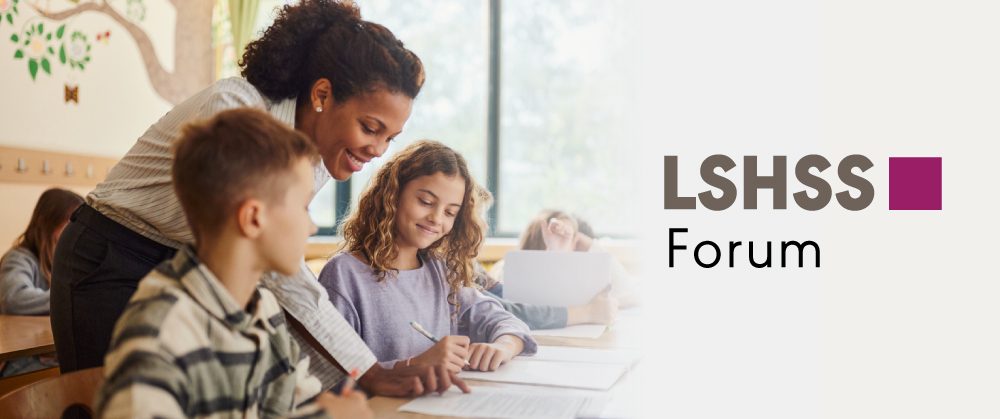In implementation science, researchers study ways to promote the use of research findings and evidence-based practice, improving the quality and effectiveness of interventions. A recent review found that most implementation science in communication sciences and disorders took place in medical settings. Meanwhile, for more than half of ASHA’s speech-language pathologists (SLPs) who work in schools, and the millions of students who need their services, implementation science faces numerous barriers.
Guest Editors Rouzana Komesidou and Tiffany P. Hogan address these barriers in the latest forum in Language, Speech, and Hearing Services in Schools (LSHSS). “We can no longer ignore the gap between research and practice and its consequences on the lives of children with communication disorders,” they write in the introduction to the forum (Komesidou & Hogan, 2023, p. 1036).
In the forum, “Implementation Science in School-Based Settings,” Komesidou and Hogan present 10 articles that provide school-based SLPs with a variety of ways to bridge the research-to-practice gap and improve clinical services in schools. Learn more about the forum below.
Implementation Science in Action!
After an introduction by Komesidou and Hogan, the forum opens with three examples of the impact of implementation science in the schools. First, Ramos-Heinrichs presents case studies of children with stuttering problems participating in solution-focused brief therapy, a counseling treatment approach that emphasizes active participation and ownership of treatment.
Farquharson and colleagues argue that for overworked school-based SLPs, learning new skills through implementation science should be paired with “de-implementation science,” the discontinuing of low-value practices. Then, Bridges et al. show how a research team was able to adapt a language-based curriculum for children at risk of low language comprehension.
Influences on and Barriers to Implementation Science
Christopulos and Redmond surveyed professionals on universal screening of developmental language disorder and suggested that SLP assistants (SLPAs) could help administer these screenings without affecting the workload of school-based SLPs. Later, Quinn and colleagues discussed how teachers and school-based SLPs could more easily integrate augmentative and alternative education (AAC) into classroom activities.
DeLuca et al. used a novel survey tool to identify actionable steps that districts can take to increase interprofessional collaboration for supporting children with language-based disorders in schools. Then, Fulcher-Rood and Castilla-Earls reported on child language assessment in school and non-school settings, emphasizing the importance of contextual factors on decision-making processes.
Gaps and Opportunities
Hall-Mills and colleagues report on school-based SLPs’ engagement with evidence-based practice throughout the last 10 years and recommend systemic changes—such as scheduled time at work dedicated to evidence-based practice—to increase these practices. Then, guest editors Komesidou and Hogan return to provide school-based SLPs with an implementation toolkit and framework that they can use to incorporate implementation science in everyday settings. The final article in the forum by Gallagher et al. presents findings from a scoping review highlighting current gaps and priorities in implementation research.
We’d like to thank Drs. Komesidou and Hogan, and all of the authors and reviewers, for bringing this forum to LSHSS. We hope that these articles provide school-based SLPs with new ideas and tools for using implementation science to adopt evidence-based practices.
You can read the entire forum in the latest issue of LSHSS, or explore the individual articles below.
References
Komesidou, R., & Hogan, T. P. (2023). Minding the gap: Using implementation science to improve clinical practice in schools. Language, Speech, and Hearing Services in Schools, 54(4), xxxx–xxxx. https://doi.org/10.1044/2023_LSHSS-23-00147
Explore the Forum
Bridges, M. S., Curran, M., Neal, C., Piasta, S., Fleming, K., & Hogan, T. (2023). Adapting curricula for children with language comprehension deficits. Language, Speech, and Hearing Services in Schools, 54(4), 1066–1079. https://doi.org/10.1044/2023_LSHSS-22-00189
Christopulos, T. T., & Redmond, S. M. (2023). Factors impacting implementation of universal screening of developmental language disorder in public schools. Language, Speech, and Hearing Services in Schools, 54(4), 1080–1102. https://doi.org/10.1044/2023_LSHSS-22-00169
DeLuca, T., Komesidou, R., Pelletier, R., & Hogan, T. (2023). What works in collaboration? Identifying key ingredients to improve service delivery in schools. Language, Speech, and Hearing Services in Schools, 54(4), 1103–1116. https://doi.org/10.1044/2023_LSHSS-22-00180
Farquharson, K., Cabbage, K. L., Reed, A. C., & Moody, M. A. (2023). Subtract before you add: Toward the development of a de-implementation approach in school-based speech sound therapy. Language, Speech, and Hearing Services in Schools, 54(4), 1052–1065. https://doi.org/10.1044/2023_LSHSS-22-00176
Fulcher-Rood, K., & Castilla-Earls, A. (2023). Differences in child language assessment practices between school-based and non–school-based speech-language pathologists: Results from a nationwide survey. Language, Speech, and Hearing Services in Schools, 54(4), 1117–1135. https://doi.org/10.1044/2023_LSHSS-22-00185
Gallagher, A., Murphy, R., Eochaidh, C. N., Fitzgerald, J., Murphy, C.-A., & Law, J. (2023). Implementation science in school-based, universal-level intervention research: A scoping review. Language, Speech, and Hearing Services in Schools, 54(4), 1173–1194. https://doi.org/10.1044/2023_LSHSS-22-00181
Hall-Mills, S., Ireland, M., Flynn, P. F., & Hoffman, L. (2023). School-based speech-language pathologists’ engagement with evidence-based practice: An update with implications for implementation research. Language, Speech, and Hearing Services in Schools, 54(4), 1155–1164. https://doi.org/10.1044/2023_LSHSS-22-00170
Komesidou, R., & Hogan, T. P. (2023a). A generic implementation framework for school-based research and practice. Language, Speech, and Hearing Services in Schools, 54(4), 1165–1172. https://doi.org/10.1044/2023_LSHSS-22-00171
Komesidou, R., & Hogan, T. P. (2023b). Minding the gap: Using implementation science to improve clinical practice in schools. Language, Speech, and Hearing Services in Schools, 54(4), 1035–1037. https://doi.org/10.1044/2023_LSHSS-23-00147
Quinn, E. D., Kurin, K., Atkins, K. L., & Cook, A. (2023). Identifying implementation strategies to increase augmentative and alternative communication adoption in early childhood classrooms: A qualitative study. Language, Speech, and Hearing Services in Schools, 54(4), 1136–1154. https://doi.org/10.1044/2023_LSHSS-22-00186
Ramos-Heinrichs, L. (2023). Solution-focused brief therapy for stuttering in public schools: Children solve their own stuttering problems in this case study. Language, Speech, and Hearing Services in Schools, 54(4), 1038–1051. https://doi.org/10.1044/2023_LSHSS-22-00172







